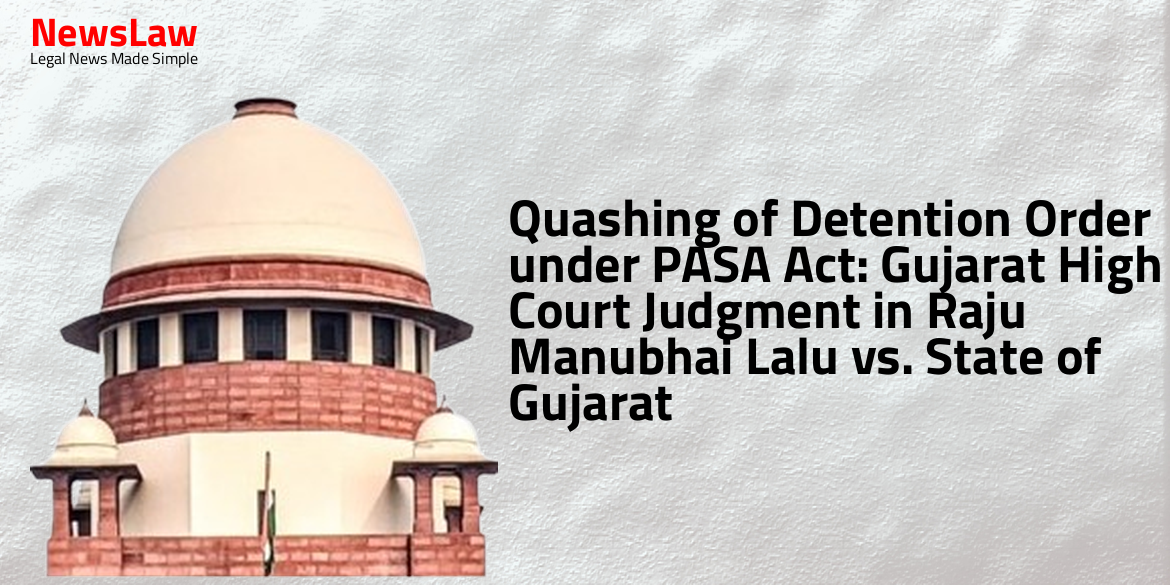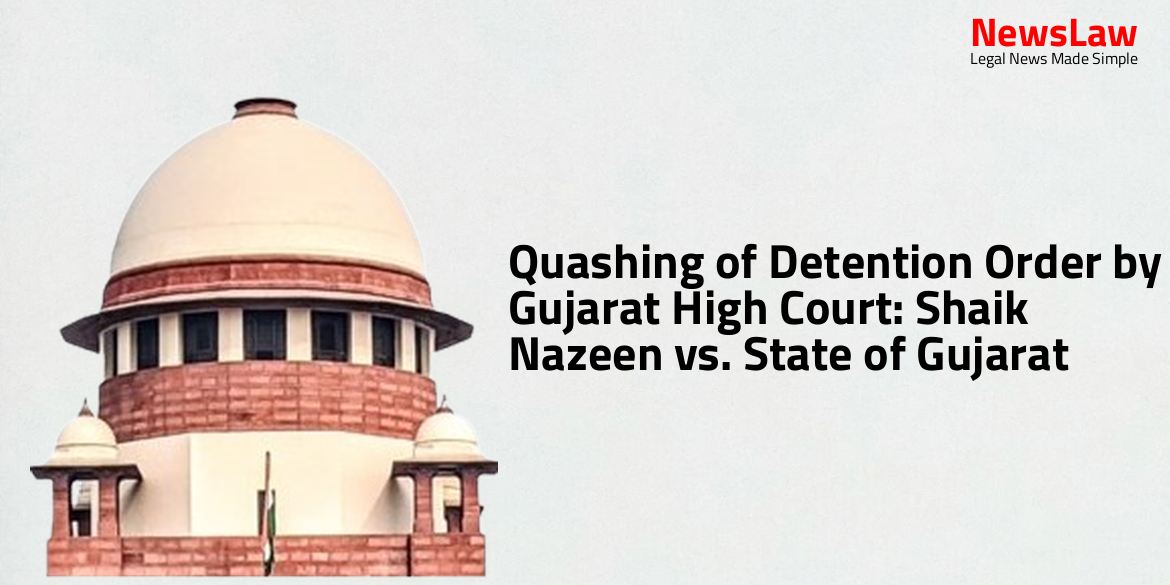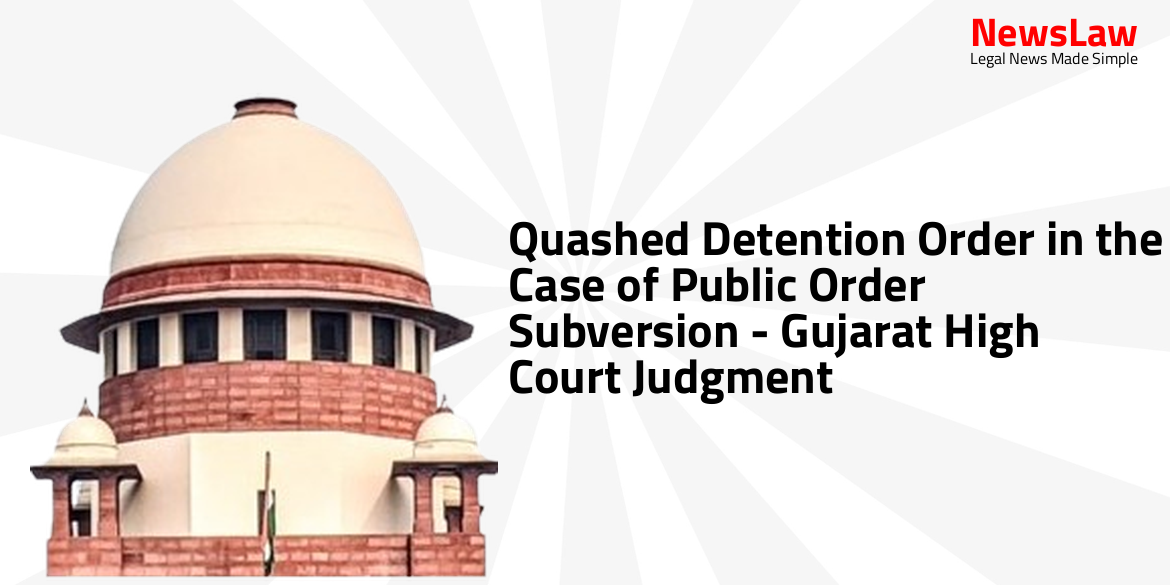The Gujarat High Court recently delivered a significant judgment in the case of Raju Manubhai Lalu vs. State of Gujarat regarding the quashing of a detention order under the PASA Act. The Court meticulously examined the facts and circumstances to determine the validity of the detention order based on a solitary offense. Stay tuned to learn more about the Court’s emphasis on the connection between activities and the maintenance of public order.
Facts
- The Court examined the facts and circumstances of the case (FAC) to assess the validity of the detention order dated 08.11.2023.
- The petitioner challenged the order of detention by the Police Commissioner of Vadodara, alleging that he was detained as a ‘bootlegger’ based on a solitary offence registered against him.
- The petitioner sought quashing of the impugned detention order and immediate release from detention.
- The primary relief sought was the quashing and setting aside of the detention order under PASA Act dated 8-11-2023.
- The Court considered the legality and justification of the detention order in light of the petitioner’s solitary offence as a ‘bootlegger’.
Arguments
- Advocate for the detenue argues that the order of detention should be quashed as the solitary offense under the Prohibition Act does not meet the definition under section 2(b) of the Act.
- It is contended that the alleged illegal activity does not relate to the maintenance of public order.
- Except for witness statements, FIRs, and Panchnama, there is no significant evidence linking the detenue’s activities to a breach of public order.
- The State could have filed a cancellation of bail application through due process of law to prevent the petitioner from further offences.
- The detaining authority supported the detention order, citing sufficient material and evidence found during the investigation.
- The detenue was deemed to be habitually engaging in activities defined under the Act, based on the evidence provided.
- The detention order was based on the registration of a solitary FIR.
- The petitioner’s advocate argued that the detenue’s actions in the solitary criminal case did not pose a significant threat to society.
- The order of detention was issued on 04.11.2023.
Analysis
- The court found that the detention order did not reflect the consideration of canceling bail as a method to curtail the petitioner’s activities.
- Merely having a case registered against the petitioner under the Prohibition Act does not by itself impact public order.
- The Court noted that the detention of the detenus was not justifiable as their actions did not pose a threat to public order.
- In line with the Supreme Court’s decision in Darpan Kumar Sharma case, the Court quashed the detention orders in this group of petitions.
- In the case of Raju Manubhai Lalu vs. State of Gujarat, the Court mentioned that mere possession or selling of liquor does not create harm or danger to public order.
- Similarly, in the Vasava Umeshbhai Laxmanbhai vs. State of Gujarat case, the detaining authority failed to prove that the petitioner’s activities affected public order adversely.
- The State is advised to seek other remedies such as cancelling bail or filing an appeal to a Higher Court if the detenue is deemed a menace to society.
- The preventive detention law should not be used as the primary remedy in cases where other penal laws can address the situation.
- The subjective satisfaction of the detaining authority must be legal and in line with the law, and offenses in the FIR must relate to public order as required by the Act.
- Material should establish that the person poses a threat to society, disturbing the public order significantly, to warrant preventive detention.
- Emphasis is on ‘public order’ and not ‘law and order’ as per Section 2(b) of the Act.
- Preventive detention orders can be issued based on a single incident or offense if there is justified subjective satisfaction supported by objective material indicating a potential disturbance of public order.
- The recent decision in Shaik Nazeen v. State of Telangana and Ors. highlights that the subjective satisfaction can be invalidated if not based on proper material.
- The petitioner may be punished for alleged offences committed, but the acts did not affect public health or community life’s even tempo.
- Being a ‘bootlegger’ does not automatically justify preventive detention under PASA Act unless activities adversely impact public order.
- Mere registration of FIR/s does not establish a connection with the breach of public order for invoking powers under section 3(2) of the Act.
Decision
- The detenue is ordered to be set at liberty forthwith if not required in any other case.
- Direct service is permitted.
- Rule is made absolute accordingly.
- The present petition is allowed.
- The impugned order of detention dated 08.11.2023 is quashed and set aside.
Case Title: BHAGVANDAS DHANSING KUSHVAH THROUGH GUMAN MAHARAJSINH Vs. POLICE COMMISSIONER
Case Number: R/SCA/632/2024



